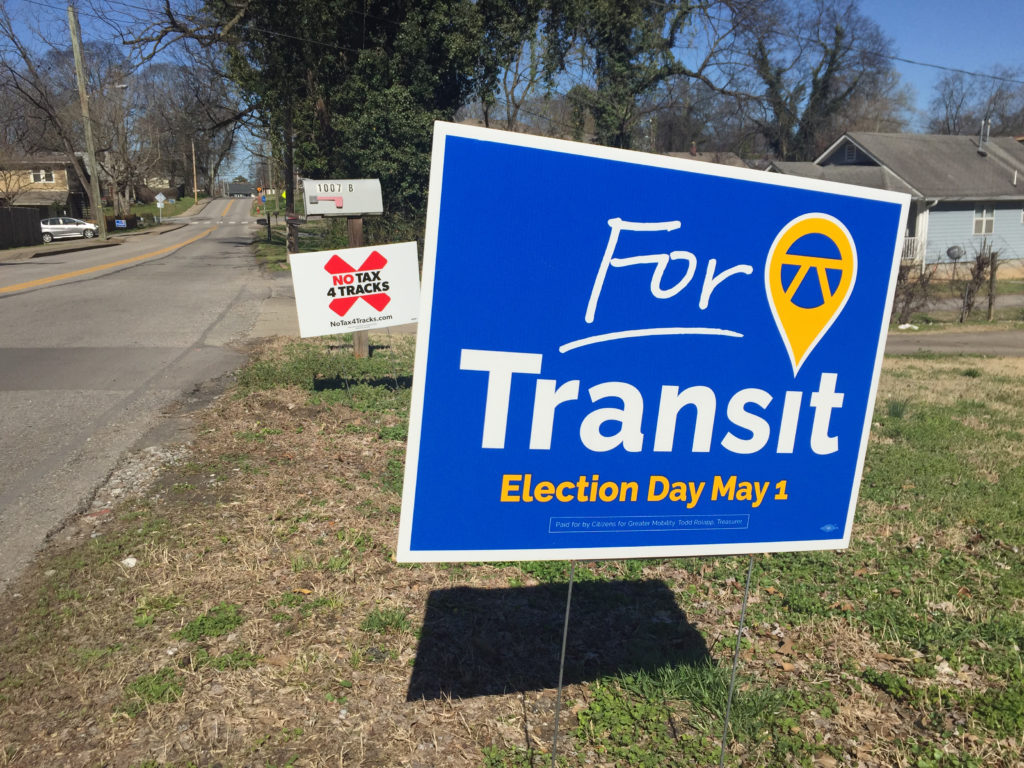
Both sides in the debate over Nashville’s proposed mass transit plan say the referendum scheduled for May 1 should go forward, despite Mayor Megan Barry’s surprise announcement Tuesday that she’s stepping down after pleading guilty to felony theft in connection with her extramarital affair.
The leading organization supporting the $5.4 billion light-rail proposal and one of its top counterparts opposing it both said Tuesday that the vote in eight weeks should continue, even though Barry played a key role in formulating the plan.
Barry started pushing mass transit from her first day in office in 2015. She lobbied state government to allow the one-cent sales tax increase needed to fund it, and her administration helped develop the plan for 26 miles of light rail.
Yet Metro Councilman Jeremy Elrod, who sponsored the resolution that put the plan on the May ballot, says it would be a mistake to see the proposal as Barry’s.
“There are hundreds of — I think it’s up to 121 organizations — that are supporting it now. Thousands of people across the city have signed petitions supporting it,” Elrod said.
“You know, our traffic isn’t getting any better.”
The Metro Council approved the referendum shortly after news broke of Barry’s nearly two-year relationship with the head of her security detail, Sgt. Rob Forrest. The two traveled together and Forrest racked up tens of thousands of dollars in overtime.
On Tuesday, Barry pleaded guilty to one count of felony theft, for Forrest’s travel expenses, and was ordered to pay $11,000 in restitution. She also agreed to resign.
Forrest also pleaded guilty to theft for his overtime. He was ordered to pay the city back $45,000.
Distraction aside
The pleas ended a scandal that had swirled for more than a month — a time when backers of the transit plan had been trying to build support. A recent poll by Vanderbilt University showed them holding a slight plurality, with more than a third of voters still undecided.
The Transit For Nashville Coalition says it wants to push ahead with the referendum. Leaders declined an interview but said in a prepared statement that they’re working hard.
“The people of Nashville made their voices heard over years of public input and deserve to vote on May 1,” they said. “This is Nashville’s Transit Plan.”
Their main opponent, No Tax for Tracks, doesn’t want to wait either. Jeff Ellers, a spokesman for that organization, says they’re ready to defeat what they see as a flawed plan.
“We’ve said all along our biggest concern is Davidson County residents will pay one of the highest sales taxes in the country for a light rail plan that won’t help congestion,” he said.
But that viewpoint wasn’t unanimous. Rick Williams, president of No Nashville Transit Tax, says the city should wait to see how this summer’s special election to replace Barry pans out, before moving ahead with the transit proposal.
“It’s her plan. She calls it her plan,” he said. “And so the mayor’s left now.”
It’s not clear, though, whether it would even be possible to delay the referendum. Representatives for the Secretary of State’s office and the Davidson County Election Commission says they’d have to conduct further research into the rules for altering or removing the question from the ballot, just eight weeks before it’s to take place.


